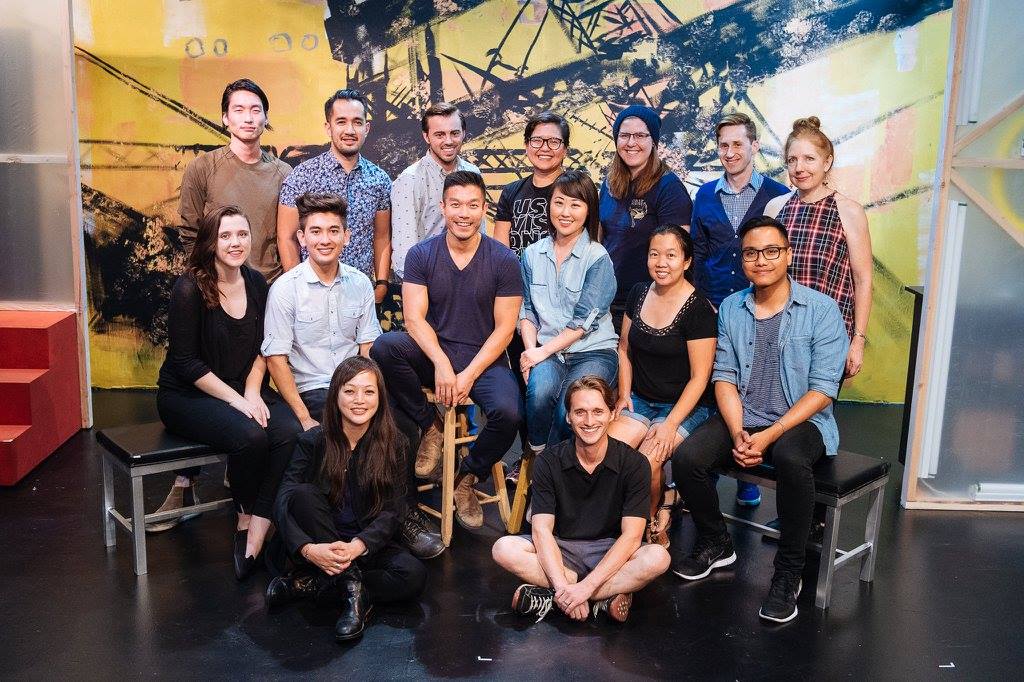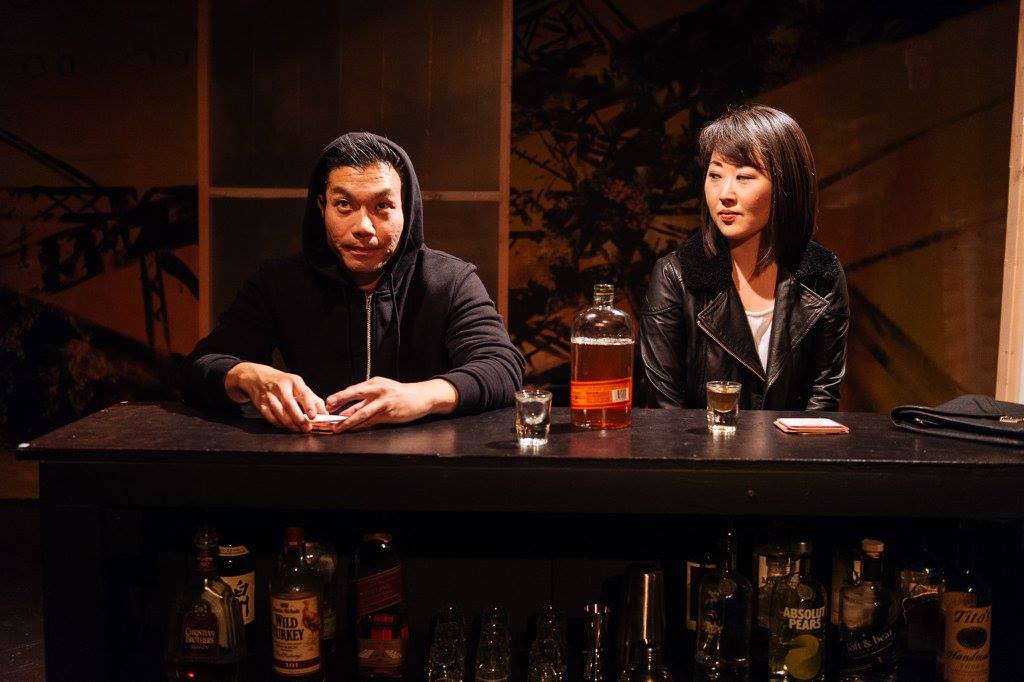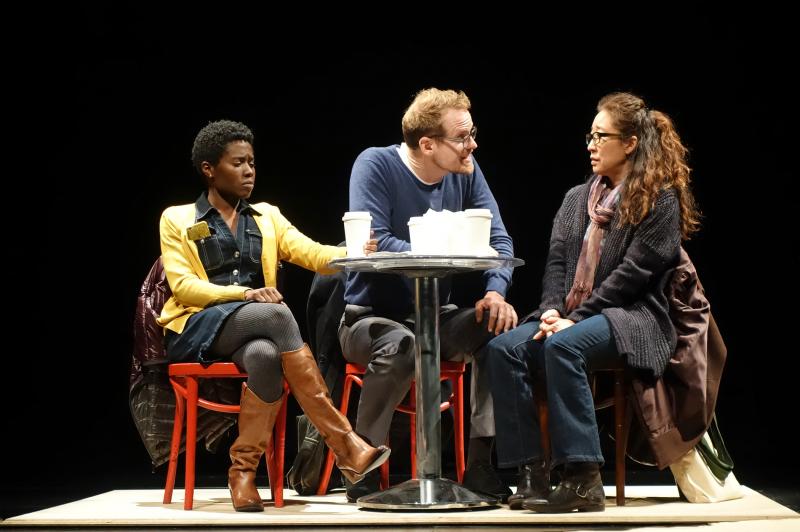Asian representation in media has been receiving a lot of attention over the last few years. Starting with the progress made on TV by shows such as Fresh off the Boat and Master of None opening the community’s eyes to the possibilities of genuine Asian American stories being told on screen (by Asian Americans), and contrasted by the relative lack of progress in film shown by the continued whitewashing of parts that could, and some argue should, be played by Asians. While much of the conversation has been centered on the screen, there are also a growing number of producers and actors working to bring Asian American stories and characters to the stage as well. One of these leaders is Artists at Play’s Julia Cho.
A few blocks away from the Sunset Strip, Julia sits down with us in the lobby of The Lounge Theater. Her new production The Two Kids that Blow Shit Up, a play written by Carla Ching, had just opened for previews and she was graciously spending a few moments of her precious free time to talk.
Nicknamed the “Human Swiss Army Knife” by her peers, Julia is well regarded as someone who knows how to get stuff done. An actor by trade, Julia is also a founding member of Artists at Play, a Los Angeles based theatre collective made up of Asian American creative professionals.
“Artists at Play was founded by myself, Stefanie Lau, Marie-Reine Velez, and Peter Kuo.” Julia explains, “The four of us got together really because we wanted to do a play”
That play would become the collective’s first production Ching Chong Chinaman, a play by Lauren Yee. “As you can tell by the title a very subversive comedy upending Asian American stereotypes.” She laughs, “We were all theater geeks and we got together to put on that show and then things just snowballed and we realized that we really liked working together and the group was born out of that.”

Since that first production, Artists at Play have gone on to do even more productions and expanded their programs to include a summer reading and salon.
“We’re all about promoting, highlighting Asian American voices and stories on stage, and in turn providing opportunities not only for Asian American artists,” Julia says, “but making good theater and involving a diverse group of artists to help us along the way”
Artists at Play specialize in working with contemporary plays focused on Asian American narratives.
“The fact that Asian American theater exists is because we’re not as present in mainsteam American theater, I think people who aren’t familiar with that would think, oh there’s Miss Saigon and King and I,” she explains, ”but there’s so much more to Asian American theater than that. And I think at Artists at Play, we’re all about showcasing specifically Asian American stories. In the plays that we produce there’s always a fresh unique voice [and] a contemporary perspective. Our plays are not set in Asia, and it doesn’t always have to be about immigrant issues.”
Julia gives her current production of The Two Kids That Blow Shit Up as an example. The main characters, Diana and Max, are essentially “All-American kids,” but make references in their dialogues to culturally specific touchstones like Saturday school and frugal parents. Julia explained that these references were intelligently, and intentionally, planted in the play by the playwright Carla Ching “to let people know, you could cast this with white people, but you shouldn’t, because there are these clues here to inform you of these people’s specific heritage.”
The Two Kids That Blow Shit Up is a production that Julia is particularly excited about, not only because it is this year’s main stage production for Artists at Play, but also because it is the collective’s first world premiere of a work. The pressure has definitely never been higher for them.
“Usually our productions have been published works,” Julia explains, “with Carla, because she’s so present, she’s there with us every step of the way, we want to do the piece justice and we want to do right by her, so there’s definitely added pressure, but that pressure fuels us to do the best we can.”
To Julia, the pressure is worth it. “Writers like Carla Ching are people worth knowing and sharing,” Julia explains.

The Two Kids the Blow Shit Up tells the story of Max and Diana, two people brought together because of circumstances outside of their control and who can’t help but become, and stay, a part of each other’s lives.
“We jump around time from scene to scene. So they’re start at 38 as hardened bitter adults, and then we jump to when they are nine and they first meet as children, and so on and so forth,” Julia explains, “Seeing these scenes out of order but then being able to piece things together but then picking up clues from the previous scene and applying it to the next, I think there’s something really fun about that theatrically.”
To Julia and her colleagues, bringing these stories to the stage is their way of contributing to the growing conversation of representation in entertainment by showing that Asian American characters can be real human beings, and by adding to the canon of Asian American stories and characters. “There wasn’t a play like this when I was in college doing scene study classes,” Julia recalls. It’s her hope that by ushering this work into the world “young Asian American people can choose a scene from Two Kids the Blow Shit Up to perform in class that speaks to the in a truthful way and they don’t have to go to the default white playwrights.”
Staged Theater holds a special place in Julia’s heart, and she’s passionate to bring the art form to more and more people. We asked her to make a case for theater for entertainment. “It’s a big argument, especially in LA, which is a city that is so focused on TV and film,” Julia sighs, “but when it’s done well and done right, there’s something really magical about theater.”
Julia explains that the live nature of theater is really what sets it apart from anything else. “It’s all happening in front of you and it really depends on the actors, the design elements supporting their performances, and also there is some investment on the audience members’ part, they need to be in on it with us so it’s not as removed,” she explains, “we’re all in the same room breathing the same air together and there’s a certain level of trust and commitment that needs to be in every single one of us, performers and audience alike, to make this thing happen and I don’t think there’s anything like that you can recreate on film or screen.”
In addition to their annual main stage productions, and despite being a small team with limited resources, Artists at Play have also started to expand their footprint in the community. These programs include their “Spring Readings,” where they develop and showcase new works by Asian American writers (and which The Two Kids that Blow Shit Up was actually a part of prior to going into production), and their “Summer Salon,” where they take a well known play and cast it with veteran Asian American actors to show not only that such castings can be done, but also that these actors are perfectly capable of carrying the works. The latest salon featured John Cho in Donald Margulies’ Dining with Friends, actually pre-empting the summer’s popular hashtag movement, “we literally starred John Cho,” She laughs.
The success of these programs invigorate Julia, and she is optimistic about the future of Asian American Theater.
“Theater is a little behind I think, there’s a lot of talk with film right now in terms of furthering more representation of Asians and Asian Americans and I’m excited to see all these conversations happening, and I think that will eventually lead to actual tangible changes [that] I’m hoping that will trickle down to theater as well,” she explains, and she’s confident that Artists at Play can play a big part of that. “Look at all these diverse stories, if there’s just one idea you have about Asian American Theater, there’s so much more than that,” she concludes, “we hope that we can provide some new perspectives.”
“The Two Kids that Blow Shit Up” is moving into its 2nd week and final week of production at the Lounge Theater in Sunset (Address: 6201 Santa Monica Blvd, Los Angeles, CA 90038), and tickets are currently available for purchase.
Learn more about Artists at Play at artistsatplayla.blogspot.com and follow Julia on twitter at @thatjuliacho.
![]()

